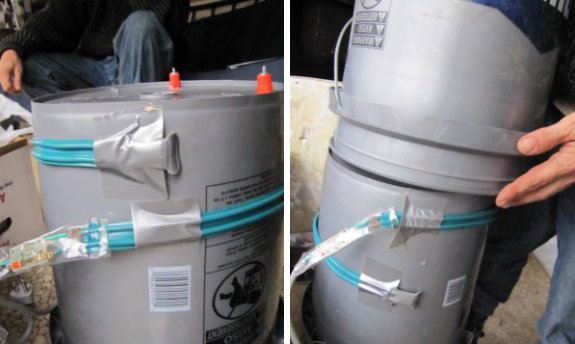
DIY heated chicken waterer installation note
The heart of our new
heated chicken waterer is
one of those electric pipe heaters.
A few pieces of tape helps it
to stay flat against the bucket while you carefully sandwich a modified
bucket over top.
Want more in-depth information? Browse through our books.
Or explore more posts by date or by subject.
About us: Anna Hess and Mark Hamilton spent over a decade living self-sufficiently in the mountains of Virginia before moving north to start over from scratch in the foothills of Ohio. They've experimented with permaculture, no-till gardening, trailersteading, home-based microbusinesses and much more, writing about their adventures in both blogs and books.
Want to be notified when new comments are posted on this page? Click on the RSS button after you add a comment to subscribe to the comment feed, or simply check the box beside "email replies to me" while writing your comment.


Roland --- Some of that sounds familiar. Did you comment that before and we just forgot about it?
I wonder if the heat tape is waterproof? I suspect not all of it, but maybe the blue part could go in the water? Hmmm....
I've been very busy lately but, still try to check in and see what you two are working on.
I only have 3 layers through this winter, I've been just giving water to them a couple time a day. I have a submersible dog water dish heater in the shop that I think would work great on a chicken water bucket. I would insulate the bucket and use one of the heat tape plug thermostats,so if the daytime temp rises it would turn off the heater.
I'm not sure if I commented on this before. Can't remember everything.
But it's just basic thermodynamics: Heat flows from warm to cold places. More temperature difference means more heat flow. Heat flowing out of the water means the water will drop in temperature. Witout added heat the water temperature would eventually reach the environment temperature. If you add just as much heat energy to the water per second as is lost, you'll keep the water temperature constant. Insulation prevents heat flow, so you need less power to keep the water temperature constant.
I'd think a pipe heater would be waterproof; there can easily be condensation on water pipes. From the photos it all looks heat-sealed to me.
Alternatively a length of small-gauge insulated electrical wire could act as a heater. (Fed by a susbtantially bigger wire and the current limited by a rheostat.) Cover the connections between the big-gauge and small gauge wire with epoxy to waterproof it, and put the rheostat away of the bucket and you should be OK.
Justin --- We had pretty good luck with a submersible heater last year. As I recalled, it worked down to about 17 degrees, at which point the nipple froze anyway and we had to put a light on it.
Roland --- Good point about condensation on water pipes. The blue part does look sealed, but not the end. I guess as long as we didn't get that part wet....